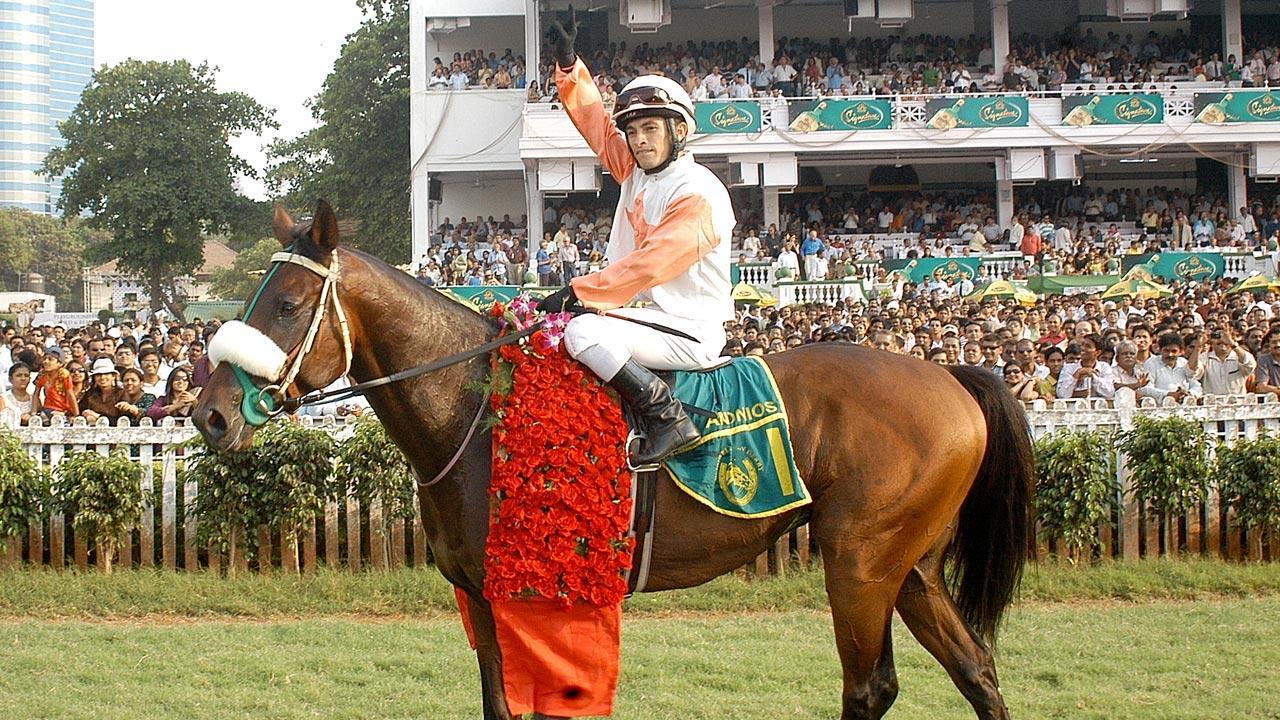The Derby prize raced past the three-million mark in 1999, and by quirk of fate, it was also the highest stakes ever earned by a Derby runner up in the history of the Indian Derby

The first "crorepati" horse Antonio (SA DeSousa up), astride, the 2009 Indian Derby winner. (Pic: RS Gupta)
Howsoever hackneyed it may sound, but the fact is all roads in Mumbai will lead to the Mahalaxmi racecourse on the Indian Derby day (Sunday, Feb 5). Generally, horse racing at Mahalaxmi caters only to die-hard racing fans, but on the first Sunday in February, thousands of other Mumbaikars, putting on their best clothes, make a beeline at the racecourse turnstiles for their annual pilgrimage: to witness the most exciting equine contest--which lasts barely two-and-half-minutes--and throws up the champion 4y old horse in the country.
This will be the 81st edition of the Indian Derby which was first won by Princess Beautiful in 1943. Princess Beautiful claimed only Rs 35,000 as winner's share. But as was expected, the Indian Derby stakes started fattening with every passing year: the winner's take-home prize crossed the Rs 1-lakh mark in 1969 (Fair Haven), and scaled the 5-lakh barrier 15 years later, in 1984, when Pesi Shroff rode first of his eight Derby winners (Enterprising).
Next year, in 1985, Dr Vijay Mallya, owner of McDowells, stepped in as sponsor of the race, and the Derby prize zoomed past the one-million mark in only eight years, when Aslam Kader rode Astonish to Derby victory (1992). The two-million prize money mark was breached when Satish Narredu rode his solitary Derby winner (Amazing Bay, 1996), also the first-ever Indian Derby winner for owner Dr MAM Ramaswamy in his own silks, after a long wait of over two decades.
Also Read: Sky Fall wins Madras Race Club Trophy
It was rumoured that Dr Ramaswamy was so desperate to win the Indian Derby that he followed the advice given by an astrologer who told him the jinx can be broken only if he first leads in a Derby winner in someone else's silks. "Ramu", as Dr Ramaswamy was fondly called, then bought a quarter share in Exhilaration (owned and bred by the Poonawalla brothers) days before the 1989 Derby. Exhilaration won the Derby, Ramu led in the winner, but had to still wait for seven more years before Amazing Bay, sporting his gold and brown silks, was first past the post in the 1996 Derby.
The Derby prize raced past the three-million mark in 1999, and by quirk of fate, it was also the highest stakes ever earned by a Derby runner up in the history of the Indian Derby. Supervite and jockey Ruzaan Choksey had finished a tame second to Saddle Up (Pesi Shroff up) who won that year's Derby in front of a 25,000-strong crowd. However, weeks later, Saddle Up was disqualified for testing positive for a banned substance, and the filly Supervite was declared as the winner. Interestingly, both Saddle Up and Supervite were owned by Dr Vijay Mallya.
In 2006, Velvet Rope (P Kamlesh up) was the first Derby winner to take home Rs 50 lakh; and Antonios, ridden by Brazilian SA DeSousa, became the first "crorepati" in 2009. Desert God (2016) and Hall Of Famer (2017) are the only two Derby winners who have taken home more than Rs 2 crore, the former holding the record (Rs 2,17,62,000) which is unlikely to be broken soon as, for the first time after 38 years, the Indian Derby will be run without a sponsor. Nevertheless, the total guaranteed stakes this time will be Rs 2 crore, and the winner's purse is expected to be about Rs 1.50 crore.
That brings us to the question: Is it really the money which attracts the best horses from all over the country to visit the Mahalaxmi racetrack on the first Sunday of February? I think not.
More than the money, it's the prestige attached with the Indian Derby because of its glorious history. In 80 years since 1943, the Derby winning horse owners came from various sections of the society--the maharajas and the heads of princely states, the queens and the princesses, the film financiers and film stars, the breeders and the industrialists--but I am sure they would not hesitate to confess it's not the money, but the prestige attached with this coveted race that gave them a high after leading in the Indian Derby winner. They--and their trainers and jockeys--would have put in the same effort, and dreamt the same way, even if the winner's prize were only one rupee!
 Subscribe today by clicking the link and stay updated with the latest news!" Click here!
Subscribe today by clicking the link and stay updated with the latest news!" Click here!








